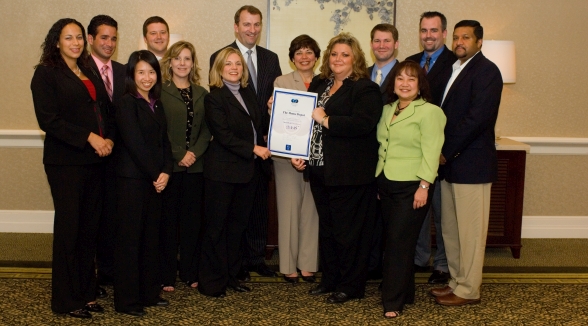2006
2006: Ben Cook Appointed Chairman
BEN COOK OF HOME DEPOT TO CHAIR INSTITUTE COUNCIL
The Global Institute of Logistics is pleased to announce that Ben Cook, Senior Manager of Global Trade Services for US-based home improvement retailer Home Depot and Executive Director of the Maritime Logistics Council is to chair the US Chapter of the Council. The Maritime Logistics Council is a major initiative launched by the Institute in April to develop joined-up thinking in maritime logistics. The Council promotes the development and enhancement of a true collaborating culture among the different maritime logistics stakeholders.

Cook believes that the global business arena is more dynamic today than at any point in history and it is imperative that multinational organizations embrace collaboration while developing strategic relationships with all entities in the value chain. Complexities in global sourcing and trade have resulted in longer lead times, increased variability and complex regulatory requirements, which combine to threaten a firm’s competitive position. By adopting a collaborative mindset with all supply chain partners, companies are positioned to ensure success in the new global economy.
The Global Institute of Logistics is unique in its approach as all nodes of the supply chain gather to discuss challenges as well as opportunities. With his company on board, there is a large importer; a port operator, outsource logistics companies and a value-added service provider. This mix helps the companies involved to see which initiatives overlap and are common to all, and which are unique to their particular element of the chain. Furthermore, the lack of standardized processes, data and documents amongst importers and service providers has led to challenges in cargo visibility.
The goal of the Americas Chapter is to work collaboratively to define critical data elements that would increase cargo visibility and to then work together to develop a global industry standard for supply chain data elements including purchase orders, packing lists and other critical documents.
The biggest benefit from being involved in the Institute, Mr Cook believes, is that it provides a platform for members to brainstorm benchmark and identify where they can add value to each other’s businesses, rather than feel they are working in a vacuum. They can not only share new ideas, but also validate existing business practices while setting new global standards. Cook feels it will become even more interesting as the group expands, perhaps attracting a major consumer products manufacturer, whose needs would be different from any existing member at the moment.
The inaugural meeting of the US Chapter of the Council will be held on Monday 27th November, 2006 in San Francisco.
Ben Cook is Senior Manager of Global Trade Services for US-based home improvement retailer Home Depot. He is responsible for developing global trade strategy, import/export compliance and oversight of 3rd party logistics service providers for the third largest importer in the United States.
Cook spent four years in the United States Army where he was a military intelligence officer and oversaw classified intelligence and security programs in addition to training foreign military forces on peacekeeping operations and nation building strategies. Upon completion of his tenure in the US Army, Cook joined a small e-commerce start up and oversaw marketing and brand development strategy. He later attended the University of Tennessee, earning an M.B.A. in supply chain management and marketing.
Upon completion of his advanced degree, he joined The Home Depot’s International Logistics organization (2003), first in an analytical role developing six sigma based supply chain processes and later moving into senior management overseeing holistic global trade operations and strategy.
2006: Home Depot Designated With Best In Class Status
ATLANTA JULY 2006
HOME DEPOT DESIGNATED BEST IN CLASS

CELEBRATE THEIR ACCREDITATION
AT THE INTERCONTINENTAL BUCKHEAD ATLANTA
“United States BCO’s Sourcing in China: The Logistics Challenges” is an ongoing Institute research program focussed on southern China . The first module examined on how the US Beneficial Cargo Owners (BCO’s) from the consumer goods and retail sectors were coping with this region’s particular logistical challenges.
The research program is designed to understand how companies manage the dynamics of global trade in this new scenario and to determine how the most adaptive were coping with its challenges. Furthermore The aim of the research is to establish accepted best practice by the stakeholders in Sino–US trade, creating ‘bench-marks’ and to promote standard operating procedures and their adoption by other shippers.
The research identified the early adopters at brand level and led to the accreditation of Home Depot with “Best in Class” in the execution of container logistics strategy.
Home Depot’s international logistics departments has direct relationships with each stakeholder in its global logistics process and while like majority of Fortune 500 companies, it outsources directly to third party logistics provider’s (3PL’s) however it regards as “best practice” to have direct contact with the the key logistics service providers, particularly the liner shipping company and the container terminal operator. Home Depot are the pioneers in managing direct relationships with container terminal operators.
Beneficial Cargo Owners including Home Depot do not have contractual relationship with any of stakeholders inside the port, leading it to a dependence on third parties for status reports etc. This leads to misreporting and guessing about the status of a particular container. Home Depot mitigated this by liaising directly with the container terminal operator. This led led directly to greater Visibility, increased Velocity and added Value add in their container logistics processes.
For terminal operators direct relationships with their end user had a direct influence on decisions by shipping lines to include their terminal on their network maps. Shipping lines are heavily influenced by their upstream customers − the port’s end users.
The collaboration also leads to logistics innovation particularly in the area of “Port Centric Logistics” Port Centric Logistics models have led to a myriad of new logistics programs: For instance DC Bypass whereby Beneficial Cargo Owners instead of shipping containers of a product to the USA where they would then be cross-docked for store delivery, execute the cross docking process in China,thereby eliminating a relocation move at the receiving port and, in doing so, cut out considerable costs.

